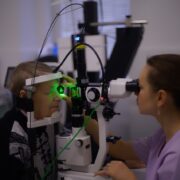The Impact of Digital Devices on Eye Health: Understanding and Preventing Digital Eye Strain
In today’s technology-driven world, the use of digital devices such as smartphones, tablets, and computers has become an integral part of daily life. While these devices serve numerous practical and entertainment purposes, their prolonged use raises potential concerns about the impact on our eye health. As leading opticians dedicated to protecting and nurturing your vision, we at Perspective Optometrists strive to highlight the importance of recognising and addressing digital eye strain, ensuring the long-term health of your eyes in an increasingly digital world.
In this comprehensive blog post, we will unearth the potential risks associated with the extensive use of digital devices, focusing on the widespread issue of digital eye strain. We will help you identify its common symptoms and understand its underlying causes. Furthermore, we will present valuable advice on preventative measures and practical ways to alleviate digital eye strain while continuing to engage with digital devices responsibly.
1. The Impact of Digital Devices on Eye Health
The extensive daily use of digital devices such as smartphones, tablets, and computers raises concerns about potential harm to our eye health. One of the most prevalent issues associated with digital device use is digital eye strain, also known as computer vision syndrome. Prolonged screen time can cause physical discomfort and exacerbate pre-existing eye conditions. Some of the potential impacts of digital devices on eye health include:
– Increased eye strain and fatigue: Continuously focusing on digital screens can cause strain on the eye muscles and lead to fatigue, discomfort, and difficulties maintaining visual focus.
– Dry and irritated eyes: The use of digital devices often involves reduced blink rates, resulting in less efficient distribution of our tears, dry eyes, and associated irritation.
– Blue light exposure: Digital screens emit a type of blue light known as high-energy visible (HEV) light, which may contribute to long-term damage to the retinal cells and is linked to an increased risk of age-related macular degeneration.
– Development and progression of myopia: Extensive near work, such as screen time, may contribute to the onset and progression of myopia (short-sightedness), particularly in children and young adults.
2. Recognising Digital Eye Strain: Symptoms and Causes
To effectively address and manage digital eye strain, it is essential to identify its common symptoms and understand the factors contributing to their development. Some prevalent symptoms of digital eye strain include:
– Blurred vision: Prolonged screen use, combined with the constant adjustments required to maintain focus, can lead to periods of blurred vision and difficulties shifting focus between near and far objects.
– Headaches and eye discomfort: Straining the eyes for extended periods may cause tension headaches and feelings of discomfort or heaviness around the eyes.
– Dry eyes: Reduced blinking rates during screen use can result in an insufficient tear film to lubricate the eyes, causing dryness, redness, and irritation.
– Neck and shoulder pain: Poor posture while using digital devices can lead to muscle strain in the neck and shoulders, contributing to overall discomfort during and following screen time.
3. Preventative Measures and Techniques for Alleviating Digital Eye Strain
With expert guidance and practical measures, you can protect your eyes and vision and alleviate the symptoms of digital eye strain. Some helpful tips and techniques include:
– Follow the 20-20-20 rule: To provide regular breaks for your eyes, remember to look at an object at least 20 feet away for 20 seconds, every 20 minutes during screen use.
– Adjust screen settings and ergonomics: Reduce screen brightness, enlarge text size, and ensure your screen is positioned at a comfortable distance and angle to minimise the strain on your eyes and neck.
– Blink frequently: Remember to blink consciously and regularly to maintain adequate tear production and eye lubrication.
– Use blue light filtering options: Make use of the blue light filtering settings available on your digital devices or consider investing in blue light blocking glasses to reduce potential harm from long-term exposure.
– Incorporate eye exercises: Engage in simple eye exercises, such as looking up and down or rotating your eyes in a circular motion to relax the eye muscles and reduce strain.
4. The Importance of Professional Consultation and Regular Eye Examinations in Managing Digital Eye Strain
A balanced, well-rounded approach to managing digital eye strain involves incorporating personal prevention and alleviation strategies, as well as seeking professional support from qualified optometrists. The benefits of consulting with eye care professionals include:
– Comprehensive assessment: A thorough eye examination can help identify the presence of digital eye strain or any underlying vision issues that may contribute to its symptoms.
– Tailored advice and solutions: With a comprehensive understanding of your eye health and lifestyle, qualified optometrists can offer personalised advice, visual aids, and solutions to support you in navigating the challenges of digital device use.
– Monitoring and follow-up care: Scheduling regular eye examinations allows for ongoing monitoring of your eye health and any digital eye strain symptoms, ensuring your preventative measures and treatment plans remain effective and up-to-date.
Safeguard Your Eye Health in the Digital Age with Perspective Optometrists
Understanding the impact of digital devices on eye health is crucial in protecting your vision and ensuring long-term ocular well-being. By recognising and addressing the symptoms of digital eye strain, along with adopting practical preventative measures, you can enjoy the benefits of digital technology without compromising your eye health.
Turn to Perspective Optometrists for comprehensive eye tests in London, We will also provide expert advice and tailored solutions to protect your eyes in our increasingly digital world. Together, we can safeguard your vision and empower you to thrive both online and offline.














